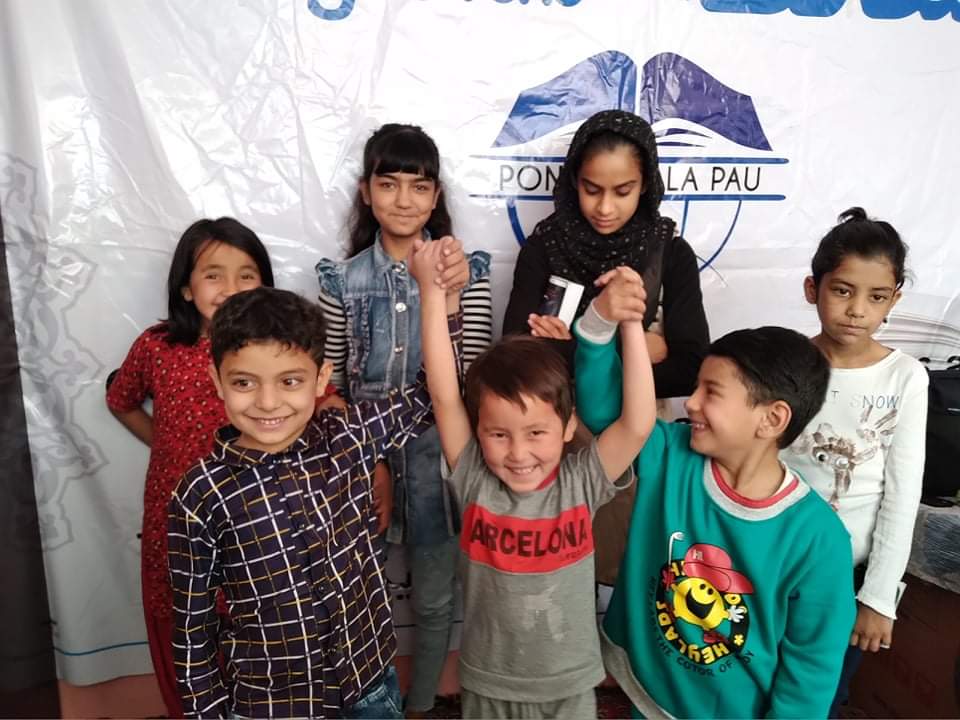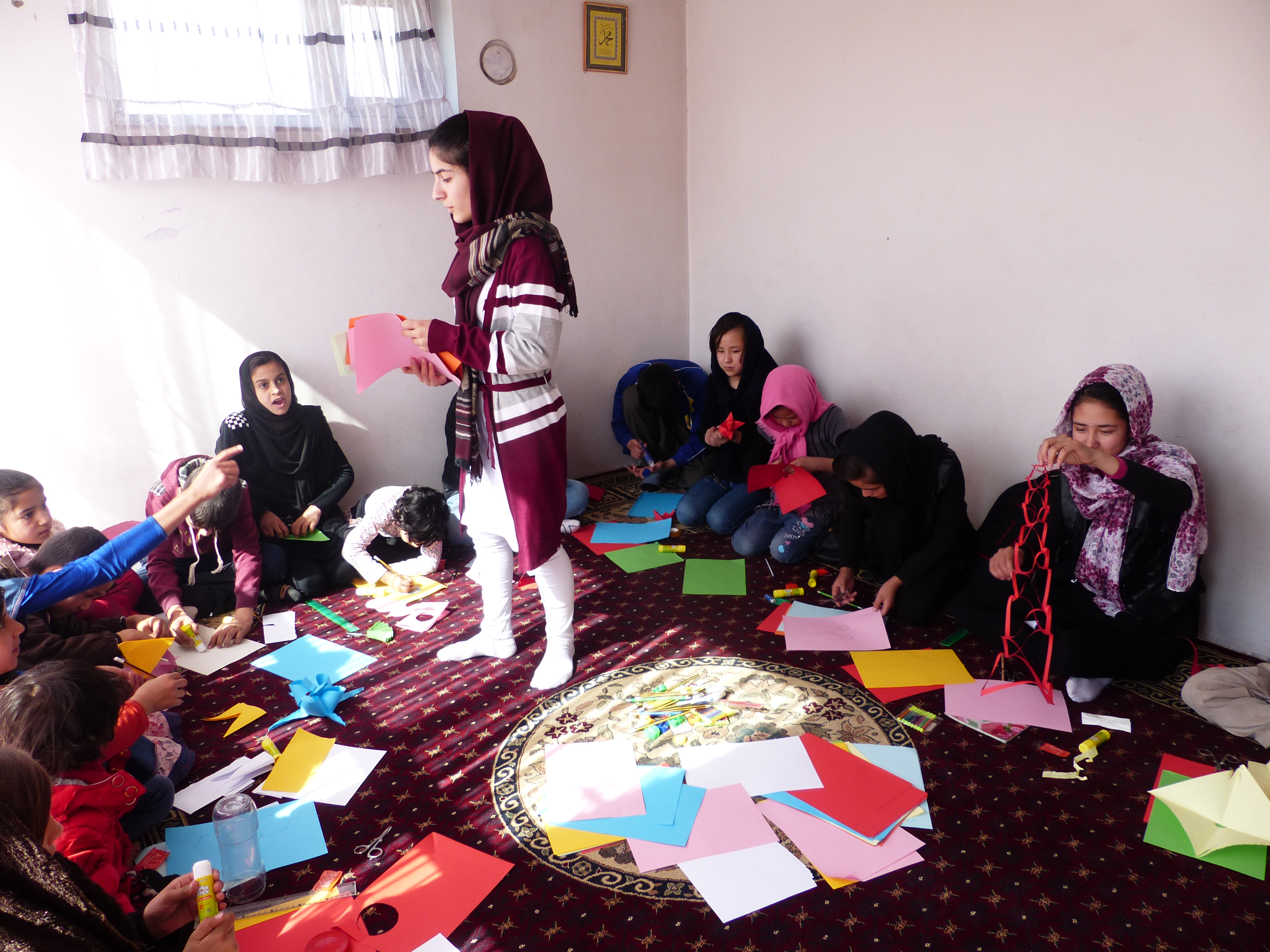Laura Pons and Dídac Navarro: "At the University there is a lot of potential and energy to change the world".
Laura Pons and Dídac Navarro: "At the University there is a lot of potential and energy to change the world".
Laura Pons and Dídac Navarro: "At the University there is a lot of potential and energy to change the world".
We interviewed Laura Pons (UPF alumni) and Dídac Navarro, members of the organization Ponts por la Pau, which this year will be present for the first time at the UPF Solidària Fair explaining their work. Among their projects we find the "Socio-educational project and care for women in Nangarhar, Afghanistan", which has been funded in the call 2022 of UPF Solidarity.
Laura did her master's degree in Criminology and Criminal Enforcement at UPF. Currently, she participates voluntarily in the organization. Dídac is part of the technical team of Ponts per la Pau, a non-governmental organization dedicated to protect and promote the rights of women, youth and vulnerable Afghan minors as well as those who arrive in Catalonia and are welcomed.
Interview
This year you have received, for the first time, financial support from UPF Solidària for your organization. What do you think about the University's involvement in cooperation and development initiatives? How did you hear about the call?
 Yes, we are very happy that UPF wanted to trust in our project. We think it is essential that the University promotes cooperation with projects in the global south, since we are far from the public administration to allocate 0.7% of GDP to cooperation as proposed by the UN and claimed by the esteemed Arcadi Oliveres, which was also one of the demands of civil society during the 15M. Specifically, we find that it makes a lot of sense for the University to contribute to projects linked to the task or in the fields with which we work from the different research teams and the degrees/masters. The relationship of our project with the University has a more transversal dimension, since we do cooperation and humanitarian emergency in Afghanistan and we try to guarantee the right to education to children and women, as well as to guarantee the coverage of their basic needs, among which their psychological well-being.
Yes, we are very happy that UPF wanted to trust in our project. We think it is essential that the University promotes cooperation with projects in the global south, since we are far from the public administration to allocate 0.7% of GDP to cooperation as proposed by the UN and claimed by the esteemed Arcadi Oliveres, which was also one of the demands of civil society during the 15M. Specifically, we find that it makes a lot of sense for the University to contribute to projects linked to the task or in the fields with which we work from the different research teams and the degrees/masters. The relationship of our project with the University has a more transversal dimension, since we do cooperation and humanitarian emergency in Afghanistan and we try to guarantee the right to education to children and women, as well as to guarantee the coverage of their basic needs, among which their psychological well-being.
We found out about the call through word-of-mouth with other small NGOs, like ours, which do projects that do not reach very many people, but we try to ensure that they are of high quality.
How does Ponts por la Pau work and what are its objectives? What is the 2,800 euros you have received through the call for grants being used for?
We are currently working in three regions of Afghanistan. We have a team in Catalonia made up of technicians and volunteers, and a team in Afghanistan, where all our monitors are located. We try to ensure that the intervention of men in the projects is minimal or non-existent, and we try to offer an accompaniment where women are the protagonists of their lives. That is to say, our monitors self-manage and lead the projects, and from Catalonia we only give them technical assistance and logistical support. We do not apply welfare practices and we value the abilities and autonomy of our monitors. We listen to their needs, and depending on what they ask for, we help them to implement it in their project. Our goal is to help children and women in Afghanistan so that they can become agents of peace, people with critical and transformative capacity that can contribute to social change.
 The funding we have received from UPF is going to the Nangarhar Reading Club, a project located in the east of the country, in the south of Kabul province. There we have a group of students from a very rural region with a low literacy rate. Our girls and teenagers learn to read and write; they do art workshops, and are trained in everyday life issues. We are creating a small library and a space with tables and chairs so that they do not have to sit on the ground.
The funding we have received from UPF is going to the Nangarhar Reading Club, a project located in the east of the country, in the south of Kabul province. There we have a group of students from a very rural region with a low literacy rate. Our girls and teenagers learn to read and write; they do art workshops, and are trained in everyday life issues. We are creating a small library and a space with tables and chairs so that they do not have to sit on the ground.
Your entity was created in 2016 on the initiative of Nadia Ghulam, a well-known person in the media, both for her personal experience and for her promotion of the culture of peace. What has been the evolution of the entity until today?
Nadia started with a small project of assistance to children, in which she had children, mostly girls, for whom she tried to cover the educational needs of their families due to the costs of the education system (usually, if there was little money, the priority was to send the boys to school, not the girls). But after the Doha agreement, the countries of the global north left the country in the hands of the Taliban, and with them also went the humanitarian aid that was arriving. Because of the current context, the projects we work with have been changing in parallel to the socio-political situation and the worsening of the needs of the Afghan population. Linked to this, we have also become somewhat larger, and there are now a greater number of people involved in the project, both in Catalonia and Afghanistan. In 2016, Ponts por la Pau was helping about twenty children; currently, we serve more than 300 people directly.
What encouraged you (Laura and Dídac) to be part of this entity?
Afghanistan is one of the great forgotten countries, a country that has suffered colonization by the USSR, then by the USA, and currently suffers under an extremist, violent and authoritarian regime that is nothing more than a consequence of the colonizing processes of the global north. We have learned about the situation in the country as a result of volunteering with refugees, many of whom came from Afghanistan. Unfortunately, few people talk about the country, but Nadia Ghulam works every day to make the situation in her country visible and tries to promote the culture of peace as the only possible alternative for coexistence in our globalized society. Her work inspired us and encouraged us to help in the project.
Next Wednesday, October 19, will be the first time you will be present at the UPF Solidarity Fair. What do you expect from your participation?
We hope to meet other projects to which UPF has also contributed; we think that networking is essential. We would also like to share our story and bring the situation of women in Afghanistan closer to the university community. The task of raising awareness is part of our mission to generate agents of change. There is a lot of potential and energy in the university to transform the world and contribute to improving the situation of people in the countries of the South.
